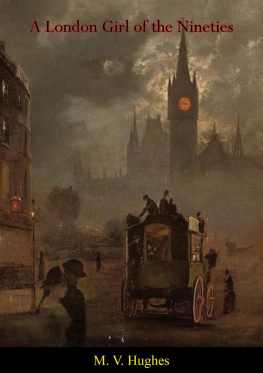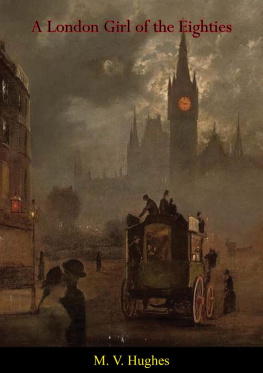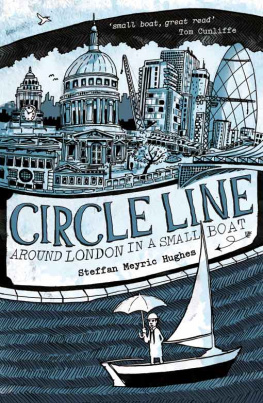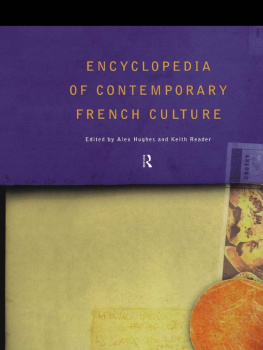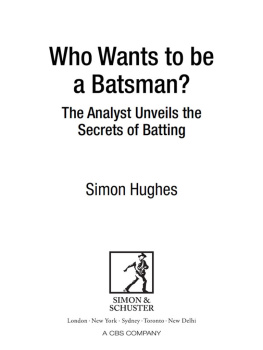This edition is published by BORODINO BOOKS www.pp-publishing.com
To join our mailing list for new titles or for issues with our books borodinobooks@gmail.com
Or on Facebook
Text originally published in 1937 under the same title.
Borodino Books 2018, all rights reserved. No part of this publication may be reproduced, stored in a retrieval system or transmitted by any means, electrical, mechanical or otherwise without the written permission of the copyright holder.
Publishers Note
Although in most cases we have retained the Authors original spelling and grammar to authentically reproduce the work of the Author and the original intent of such material, some additional notes and clarifications have been added for the modern readers benefit.
We have also made every effort to include all maps and illustrations of the original edition the limitations of formatting do not allow of including larger maps, we will upload as many of these maps as possible.
A LONDON GIRL OF THE NINETIES
by
M. V. Hughes
I. I Cut the Painter
ON the lovely May-day morning of 1890 my mother died, after an illness of only a few days. Nothing was here for tears: she had had a remarkably full and exhilarating life; she had an inborn capacity for casting care aside; she had always wished for a sudden death; and when she knew it to be at hand her only request was that I should be good to her sister Tony.
Now it was to this beloved Cornish aunt of mine that I owed, almost as much as to my parents, the two best gifts that any elders can bestow on any childrena happy childhood and as good an education as lies in their power. So that being good to Tony involved no burden, but only continuing the delight of regarding her as a second mother, and spending part of every holiday with her in Cornwall.
And my mother left me wealthy. In money, no. It was a case of no work, no dinner. But I was young, healthy, and doing what I enjoyed. I was teaching in a girls day-school in Kensington, under a fine headmistress, who allowed me to work along the lines I liked. Also I had three elder brothers, of whom I could never determine which was the most loved. Unfortunately, they were not at hand; the eldest, Tom, was living in Yorkshire with wife and children; the second, Dym, was more mobile as a bachelor, and was teaching mathematics in a school in Plymouth (a place on the way to Cornwall!); and the third, Barnholt, was at sea. These three would be bulwarks for me all through life, as mother was well aware, but she had been accustomed to ejaculate occasionally, If only I saw you married to a good man I should die happy. Well, she died quite at rest on that point, for on my twenty-first birthday I had become engaged to the man of all others that she admired most. This was Arthur Hughes, who, like Dym, was teaching mathematics. But, unlike Dym, he hated the work, and was reading for the Bar, not as an escape, but because the Law, even in its seemingly absurd intricacies, fascinated him. His work was at Bedford, and I saw something of him once a fortnight when he came up to Grays Inn to eat his dinners.
In spite of all these sources of wealth, I was desolate. A mothers death must always make one feel cut away at the roots, and in my case it was worse, because she had always been like a sister as well as a mother in her complete comradeship and youthful outlook. My brother Dym, whom she and I used to call the branch of our family at Plymouth, was well aware how badly I felt her loss, and came to the rescue by frequent letters and an occasional dash up to Kensington, to see me and take me out somewhere. As soon as the summer term was over he insisted on my spending a week with him on Dartmoor, where he and his friend Barber were as usual to be trout-fishing. He met me at Newton Abbot and took me on to Totnes for a day or two, where we could have some walks beside the broad waters of the Dart. I enjoyed the scenery and the walks enormously, but what bothered Dym was that I had no appetite, even after a long walk. I was really sorry about this, for he tried to tempt me with all he could think of. I remember his astonished cry, What! Not eat this salmon! Why, my dear child, it was in the Dart a few hours ago! Oh, Dym, I pleaded, I really would if I could. Well, darling, said he, well see what a drive over the moor will do for you tomorrow.
The air on that glorious drive blew away my lassitude. I took off my hat and let the wind do what it liked with my close-cropped hair. I laughed as I hadnt laughed for many weeks, from sheer physical exhilaration, and I felt like a newly created being as we drew up at the Duchy Hotel, Princetown. Dym had mentioned our destination, and both town and hotel sounded very grand to me. Indeed I felt a little nervous about the small size of my bag, at which Dym had raised an eyebrow when he met me at Newton Abbot. But I was reassured on our arrival, for of town I saw none at all, and the hotel was surprisingly modest in appearance. To Dym it had become, from his frequent holidays spent there, almost a second home, and the proprietress welcomed us warmly. I soon found that the simplicity of the hotel was entirely confined to the things that didnt matterits architecture and interior furnishings. Bedrooms and sitting-rooms were bare and even ugly, but the ducal quality of the hotel shone forth in its meals. These quite staggered me in their munificence. But I was prepared to justify them. How Dym laughed as he watched me dealing with the dinner after our arrival. The wind and sun of the moor had burnt my cheeks and sharpened my appetite to a quite inelegant extent; and not only Barber and his wife, but the other visitors too, couldnt help smiling. For this was one of those rare hotels (so rare that in a wide experience I have never come across another) where English people look cheerfully at all their fellow guests, and speak on the slightest provocation or none.
The meals were peculiar in another way. They faded out in the middle of the day. In fact the whole hotel faded out. After giving us a colossal breakfast, including real ham, fish, new-laid eggs, chops and steaks, raspberries and bilberries, and bowls of clotted cream at decent intervals on the table, the entire staff disappeared. I imagined that they went into contemplation on the subject of evening dinner for some hours, and then it was all hands to the task of creating it. Such degrading trifles as lunch and tea were nothing accounted of. Mrs. Barber and I were the only female guests, and the men were all there for outdoor sport of some kind. I dont know about the others, but Dym used to go the whole day between breakfast and dinner without opening his mouth, either to put anything in or utter a word. He and Barber would set off for the stream, the upper reaches of the Dart, lost to everything except trout, for they designedly fished well apart so as not to interfere with each others sport.
Meanwhile, Mrs. Barber and I knew our role quite well: we had the freedom of the moor, but must on no account come near the fishermen lest we disturb the trout, who (so the men asserted) had a rooted objection to womenfolk. Not far from the hotel was a tiny shop, the village Whiteley we called it, for it was so full of oddments of universal provision that it was difficult to edge into it. Indeed, there was a little home-made notice pinned by the door, Please enter sideways. We suspected that this had been put there by some wag in the hotel. Here we would capture every morning a few biscuits or apples or nuts to take with us on our wanderings about the moor. We also took books, but I read very little, liking rather to bask in the sun and give myself up to the uncanny fascination of the boundless moor. The time passed rapidly, and we didnt even pine for a cup of tea at four oclock, but werent we all ready for our evening dinner!


